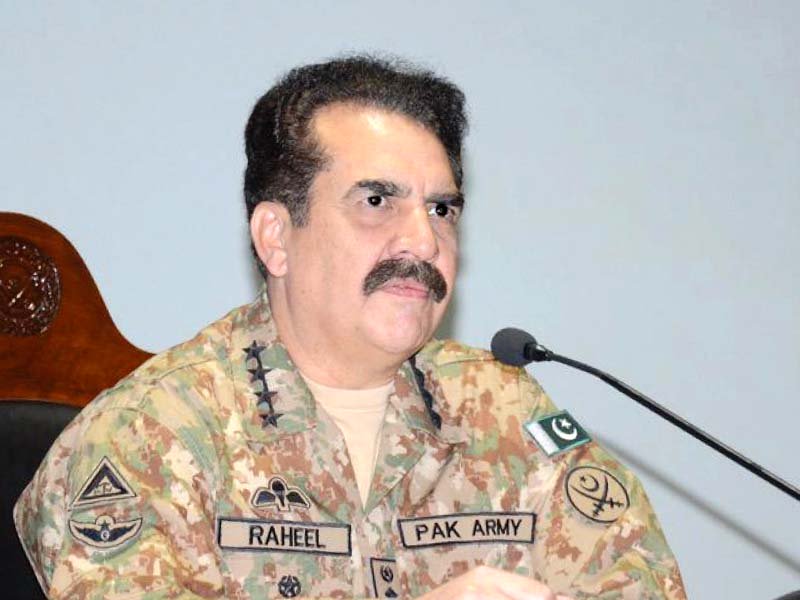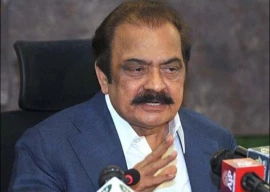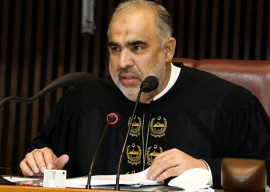
Calling Pakistan and Kashmir ‘inseparable,’ army chief General Raheel Sharif on Wednesday described the festering dispute over the Himalayan region as an ‘unfinished agenda’ of the 1947 partition in a strong rejoinder to a flurry of provocative statements emanating from India.
“While we wish peace and stability in the region, we want Kashmir’s just resolution in light of the UN resolutions and as per the aspirations of the Kashmiris to bring lasting peace in the region,” Gen Raheel said in a speech at the National Defence University in Islamabad.
His statement came against the backdrop of rising tensions between the two nuclear-armed arch-nemeses as a result of the recent controversial statements by Indian cabinet ministers and officials.
The public admission by Indian Defence Minister Manohar Parrikar that New Delhi would ‘neutralise terrorists through terrorists’ has particularly prompted strong reaction from Islamabad. The army chief also joined civilian leaders to hit back at India saying that they would not allow ‘proxies’ by other countries to destabilise Pakistan.
“While our enemies are supporting terrorism to stoke sub-conventional conflicts and destabilise our country, we are fully determined and capable of defeating their nefarious designs,” he was quoted as saying by the military’s media wing, the ISPR.
“Pakistan is opposed to using proxies against other countries and will not allow any other country also to use proxies against Pakistan,” Gen Raheel cautioned.
Both the civil and military leaderships are now more outspoken and vocal in pointing an accusing finger at the Indian intelligence agency, the Research and Analysis Wing (RAW), for whipping up terrorism in Pakistan.
Islamabad also fears the Indian security establishment is trying to sabotage the China-Pakistan Economic Corridor project. Those fears were further strengthened after New Delhi publicly opposed the multibillion-dollar project.
The army chief hinted that the ‘contours of the future war’ might change in the wake of recent developments.
About Pakistan’s counterterrorism efforts, he said noteworthy achievements in Operation Zarb-e-Azb created a space for a decisive surge against terrorists in the country’s urban areas and enhanced civil-military coordination has become even more critical to achieving a successful closure.
Pakistan rejects India claim
While the army chief described Pakistan and Kashmir ‘inseparable’, Foreign Office rubbished the Indian foreign ministry claim that the entire State of Jammu & Kashmir, including the regions of Gilgit-Baltistan, was an integral part of India.
“Kashmir is an internationally recognised dispute, pending final settlement through a free and impartial plebiscite under the UN auspices, as enshrined in numerous UN resolutions. Under these resolutions no material change is allowed, yet India, in complete violation of these resolutions, calls it a state of the union,” Foreign Office spokesperson Qazi Khalillah said in a statement.
The Indian foreign ministry described the June 8 elections in Gilgit-Baltistan as an “attempt by Pakistan to camouflage its forcible and illegal occupation of the regions.” The Foreign Office spokesperson termed the statement “interference in the internal affairs of Pakistan”.
“It is actually India which is unlawfully occupying the territories of Jammu and Kashmir. To maintain its illegal hold on that disputed territory, India has deployed over 700,000 of its forces, atrociously tries to suppress majority voice of Kashmiri Muslims and holds sham elections at gun-point,” he said.
The spokesperson argued that the dispute stems from India’s constant refusal to implement the relevant UN Security Council resolutions, which provide for a just solution to the Kashmir issue.
India’s position on Kashmir is one of utter disregard to the UN resolutions, a consistent pattern of forceful occupation, denial of the inalienable right of self-determination to the people of Jammu and Kashmir, he asserted.
Published in The Express Tribune, June 4th, 2015.

















COMMENTS (1)
Comments are moderated and generally will be posted if they are on-topic and not abusive.
For more information, please see our Comments FAQ